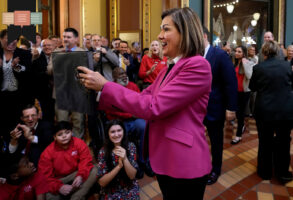
Published April 30, 2019
Sen. Charles E. Grassley (R-Iowa) declared over the weekend that the Senate would not even consider President Trump’s renegotiated North American Free Trade Agreement (NAFTA) deal, the United States-Mexico-Canada Agreement, unless he first removed tariffs on steel and aluminum. Whatever the merits of this particular demand, it demonstrates the continuing stranglehold that free-trade fundamentalism holds over Republican lawmakers. The president needs to stand firm and fight this zealotry if he is going to fulfill his promise to restore the American dream for the millions whom the modern free-trade era has left behind.
Trump understood the political import of trade from the moment he entered the race. His immigration policies got a lot of the press, but he was always on message from the start: Immigration and trade together were the package he presented to Americans. In his victory speech after the New Hampshire primary, for example, renegotiating trade deals was the first thing he mentioned after thanking his staff and supporters. The media would have heard this if they had turned down their outrage dials and actually listened to him. But the voters heard him loud and clear.
Their voice was one orthodox Republicans such as Grassley could and should have heard. I wrote that the Midwestern working class was the GOP’s future in 2013. Blue-collar whites, the group that dominates the Midwest, strongly opposed illegal immigration and thought free-trade agreements were bad for the United States well before then. But, blinded by free-trade orthodoxy, Republicans couldn’t seal the deal no matter how much they embraced their views on immigration.
Abandoning free-trade fundamentalism was crucial to Trump’s appeal. As I wrote in 2013: “These people are being pressed by competition from foreigners at home (immigration) and abroad (free trade), and they don’t like it. Conservatives therefore often do not gain the political advantage on immigration that they seek because their free trade views convince working class whites that conservatives are not on their side.” Unburdened by having to kneel at the free-trade altar, Trump was able do what Mitt Romney, for all his talk of strong immigration laws, could not.
Look across the Midwest and you see this impact in the election results, even in Grassley’s own home state. Newton, Iowa, was once the headquarters of the Maytag washing machine company, and its manufacturing plant there employed 20 percent of the city’s workforce and supported countless more jobs. But the plant was shuttered in 2007, and the town, in decline for years as the plant shrunk in size, went into a tailspin.
The area has started to recover, but its residents never forgot. Jasper County, Iowa, where Newton is located, gave Trump more than 55 percent of its votes, the highest share any GOP presidential candidate had received since 1960. His 18-point margin over Hillary Clinton was more than twice as large as Romney’s 7-point loss to President Barack Obama, and was even greater than the margins Ronald Reagan, Richard M. Nixon and Dwight D. Eisenhower received in their historic landslide reelections. Indeed, it was the largest margin any GOP nominee had received since at least the Great Depression, before even Grassley was born.
Jasper was not an isolated example. Lee County, Iowa, was once the home to the Scheaffer Pen Corporation, but by 2008, its foreign owners had closed the plant and shipped production overseas. Trump won a county that had not voted for a Republican nominee since 1980 by 16 points, a massive 31.5 percent improvement over Romney’s 15.5 percent loss in 2012. Dubuque County, Iowa, had not voted for a Republican nominee since Eisenhower in 1956, but Trump carried the manufacturing-dependent county.
Iowans who voted for Trump to bring back manufacturing jobs have reason to be happy. Bureau of Labor Statistics data show that manufacturing jobs have streamed back to the Hawkeye State almost from the minute of Trump’s election. The state had lost about 5,000 manufacturing jobs between July 2014 and November 2016, but it has gained nearly 15,000 such jobs since.
Blind protectionism is not good for the United States, but Republican officeholders need to understand that free-trade orthodoxy isn’t either. Conservative economists recognize that almost any free markets create unintended consequences, what they call “externalities.” They endorse government interventions to correct those problems, whether it is imposing carbon taxes to curb global warming, education subsidies to increase college enrollment, or spending on government entities such as the National Institutes of Health to conduct basic scientific research. Surely, the more than 2 million jobs that were lost to Chinese import competition alone between 1999 and 2011 qualify as an “externality” for which some government action is warranted.
Trump will need to deal with Grassley and others to get his new trade deal passed, and he should. But he cannot lose sight of the fact that he is president today — and can only remain president after 2020 — if he keeps faith with the voters who heard him loud and clear. If the president bends the knee and starts to worship at the orthodox Republican trade altar, the Americans who trusted him will just go find another church.
— Henry Olsen is a Washington Post columnist and a senior fellow at the Ethics and Public Policy Center.





